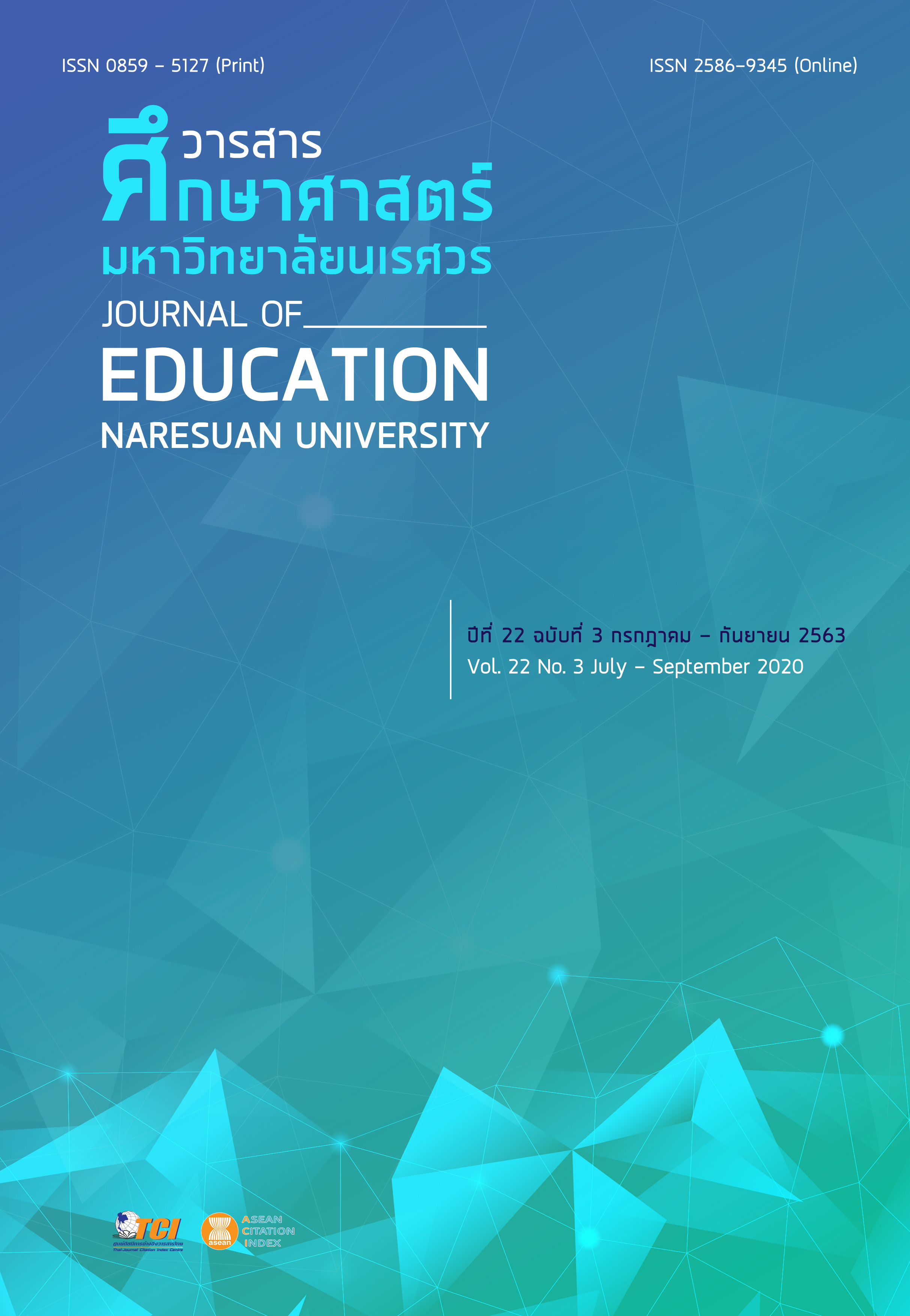THE CURRICULUM DEVELOPMENT BASED ON AUTHENTIC INSTRUCTION TO ENHANCE THE ABILITY IN ENVIRONMENTAL EDUCATION INSTRUCTION OF TEACHER STUDENTS IN RAJABHAT UNIVERSITY การพัฒนาหลักสูตรตามแนวคิดการจัดการเรียนการสอนตามสภาพจริง เพื่อเสริมสร้างความสามารถในการจัดการเรียนรู้สิ่งแวดล้อมศึกษา สำหรับนักศึกษาครู มหาวิทยาลัยราชภัฏ
Main Article Content
Abstract
The study aims to develop a curriculum based on authentic instruction to enhance teacher students’ ability to carry out environmental education instruction. The objectives of this study are particularly as follows: 1) to study basic information necessary to the development of curriculum; 2) to create and inspect the curriculum; 3) to try implementing the curriculum; and 4) to evaluate the curriculum. This study followed the Research and Development paradigm, which was consisted of 4 steps. The first step was to study basic information necessary to the curriculum development by interviewing 7 experts and to study the problems in relation to environmental education instruction of teacher students in Rajabhat University by using focus group discussion participated by 26 students who were taking courses in Bachelor of Education and those who went on pre-service teacher's training. The second step included developing the curriculum; having 9 experts evaluate the curriculum and related documents; and carrying out a pilot study on the implementation of the curriculum. The third step was to implement the curriculum with 30 fourth-year teacher students who majored in General Science at the Faculty of Education, Phetchabun Rajabhat University. The fourth step was to evaluate the curriculum by eliciting teacher student's opinions towards the curriculum and the student's attitudes towards the environment. The study found that:
1. The result of study basic information necessary to the curriculum development; teacher's competencies that were essential in carrying out environmental education instruction were as
the followings: awareness and sensitivity to environmental problems, knowledge and understanding about environmental education instruction, and ability to carry out environmental education instruction by using authentic instruction.
2. The result of create and inspect the curriculum; the developed curriculum was Environment Education Instruction subject curriculum (EDSC304) consisted of 10 components as the following: rationale, course objectives, objectives of course development, course descriptions, number of credits, number of teaching hours, learning outcomes, content structure, duration and authentic instruction activities, instructional media and learning resources, as well as measurement and evaluation. Which raise teacher student’s awareness and sensitivity to environmental problems before improving their ability to carry out environmental education instruction that represents the context as authentically as possible. The instructor facilitated the learner’s eagerness to think, practice, perform an experiment, and develop their own knowledge. There were exchanges of knowledge and collaborations between instructor and learner and among learners themselves. Learners presented their knowledge or work. The result of curriculum quality inspected by the experts revealed high level of the curriculum’s suitability. The result from the pilot study also indicated that the curriculum was potentially practical.
Article Details
The owner of the article does not copy or violate any of its copyright. If any copyright infringement occurs or prosecution, in any case, the Editorial Board is not involved in all the rights to the owner of the article to be performed.
References
Bloom, B. S. (1956). Taxonomy of educational objectives, handbook the cognitive domain. New York: David McKay.
Chumpeeruang, S., Wattanatorn, A., Hingkanont, P., & Keawurai, W. (2013). Development of curriculum to enhance desirable characteristics through dialogue for nursing students. Journal of Education Naresuan University, 15(3), 9-15. [in Thai]
Department of Environmental Quality Promotion. (2010). The 3rd Thailand Environmental Education Forum. Pullman Khon Kaen Raja Orchid Hotel Khon Kaen Province. Bangkok: Ministry of Natural Resources and Environment. [in Thai]
Khaopray, A., & Keawurai, W. (2014). The study of state and problems in the instructional management of the Environmental Education of Primary School Teacher in Phetchabun Province. The 2nd PCRU conference “Researcher for Local Development” (pp. 314-327). Phetchabun: Phetchabun Rajabhat University. [in Thai]
Manomaiyakit, J. (2016). The development of the training curriculum based on experiential learning approach for strengthening capability in learning management of English teachers in the high school level. Nakhon Phanom University Journal, 6(3), 115-123. [in Thai]
Newmann, F. M., Secada, W. G., & Wehlage, G. G. (1995). A guide to authentic instruction and assessment: Vision, standards, and scoring. Wisconsin: Wisconsin Center Education Research.
Office of the Education Council. (2017). The National Education Plan. Bangkok: Prikwarn Graphic. [in Thai]
Oonpang, S. (2014). The development of the way-of-life value in the ASEAN community through value clarification process basing on Bloom’ affective domain in grade-9 students. Journal of Education Khon Kaen University (Graduate Studies Research), 8(1), 208-217. [in Thai]
Prompichai, S., Prachanban, P., Kaewurai, W., & Suttirat, C. (2010). The development of subject curriculum in a marketing research course to enhance marketing research competence for higher vocational education students. Journal of Education Naresuan University, 13(special), 135-153. [in Thai]
Ruboon, O., Thiengkamol, N., Thiengkamol, T., & Kurukodt J. (2012). Model of environmental education teacher with inspiration of environmental conservation for global warming alleviation. European Journal of Social Sciences, 31(1), 92-102.
Suan Sunandha Rajabhat institution. (2003). Bachelor of Education Rajabhat institution 2003. Bangkok: Suan Sunandha Rajabhat institution. [in Thai]
Suttirat, C. (2011). Authentic learning. Nonthaburi: Sahamit Printing and Publishing. [in Thai]
Thongnin, P., & Nillapun, M. (2011). Development of an instructional capacity model by infusion intergration of pre-service teacher for enhancing the students’ good character. Silpakorn Educational Research Journal, 3(1,2), 92-108. [in Thai]
Waisurasing, L., & Noparoojjinda, S. (2011). The development of instruction model using authentic learning approach to enhance achievement and critical thinking ability of nursing students, Boromarajajionani College of Nursing, Suphanburi. Journal of Nursing and Education, 4(3), 63-77. [in Thai]
Wongchantra, P. (2007). Life and work of Vinai Veeravatananond. Maha Sarakham: Mahasarakham University. [in Thai]
Wongwanich, S., & et al. (2006). An accelerate project for building good character of Thai children and youth. Bangkok: Prikwarn Graphic. [in Thai]


